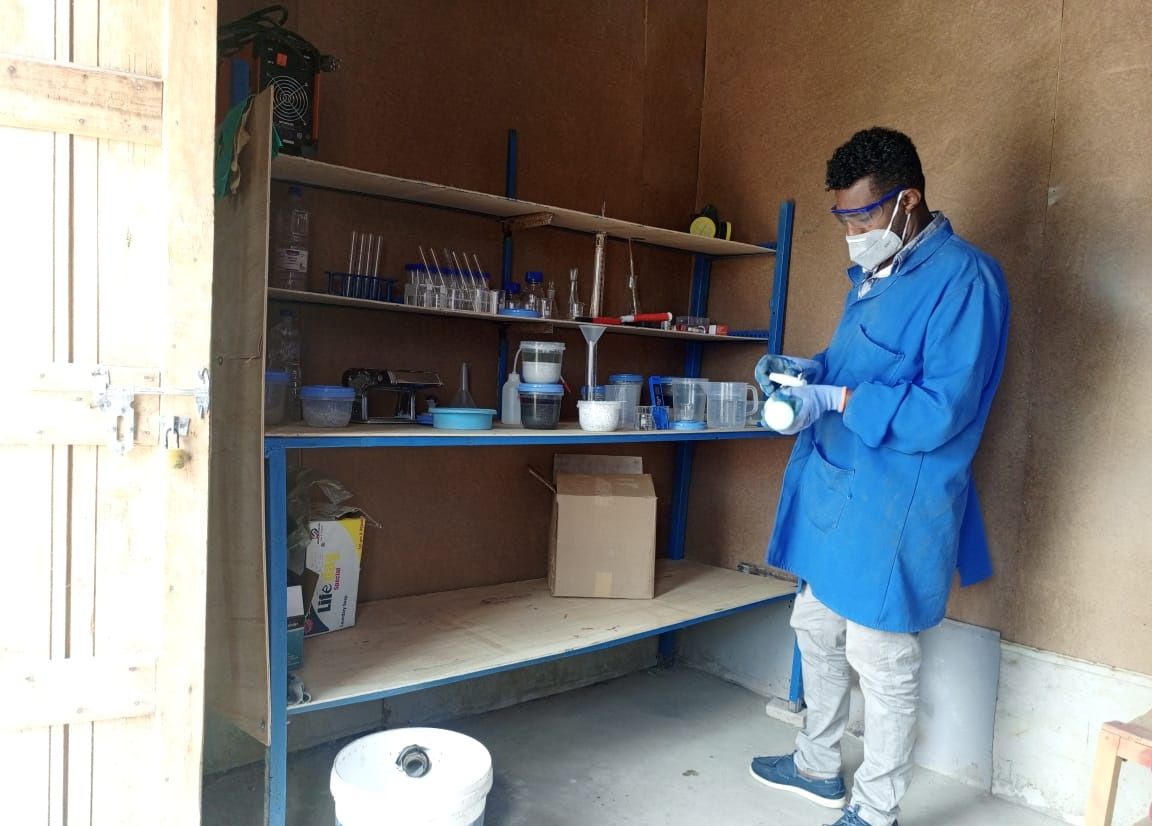Progress for 0 ad
Progress for 1 ad
Progress for 2 ad
Progress for 3 ad
Progress for 4 ad
Progress for 5 ad


Daniel Metaferiya
Addis Ababa, Ethiopia

In the Ethiopian Rift Valley, many sources of drinking water are contaminated with naturally occurring fluoride. Over 40% of wells are contaminated with fluoride that has leached from volcanic ash. High concentrations of fluoride in drinking water are a serious health concern, with dental and skeletal fluorosis being the most commonly reported fluoride-related diseases.
Nahim Ali, born and raised in Shashemene, Oromia region, then attended Jimma University, observed the country’s lack of access to clean water while working at the homegrown company Oromo Self Help Organization (OSHO).
“I noticed the clean water service problem the country was facing while at OSHO,” says Nahim, Co-Founder and CEO of Bony Filter Materials, located in Modjo, approximately 80 km east of the capital.
The company employs various methods to treat water, but Nahim became particularly interested in the bone char method used by OSHO to treat fluorine-infected water. “I’ve seen people in specific areas with yellow stains on their teeth due to fluoride in the water, mainly from the Rift Valley areas and southern parts like Hawassa and Adama,” Nahim adds.
Fluoride, persistent and non-degradable, accumulates in soil, plants, wildlife, and humans. It enters water ecosystems through geological processes and industrial waste discharges. High fluoride concentrations are primarily associated with volcanic and fumarolic activities, adding fluoride to groundwater.
Nahim explains that the bone char method used by OSHO needed modifications, such as selecting the right temperature, materials, chemicals, and bone sizes, to absorb fluoride from the water effectively.
Bone char, derived from the calcination of bovine bones at high temperatures in the absence of air, absorbs fluoride due to the nature of calcium phosphate in bones. “The water touching the product will automatically be free from fluoride,” Nahim explains.
Bone charcoal is one of the oldest known water defluoridation agents, widely utilized in the United States from the 1940s through the 1960s. However, in Ethiopia, its use has been primarily limited to non-governmental organizations.
Two years ago, Nahim and his mate from Jimma University, Henok Admasu, founded Bony Filter Materials, the first private bone char-producing company in Ethiopia, with a capital of 270,000 Birr. “The main cost was the bone crusher machine we built ourselves for 135,000 Birr,” adds Nahim who studied Mechanical Engineering.
Bony Filter Material uses mainly bull bones as raw material for Bony Bone Char. The bones undergo burning, mixing with treatment, immersion in hydrochloric acid, washing, and sun-drying. “Due to limited resources, we are forced to use natural sunlight for drying,” says the CEO. After drying, the bones’ pH level is checked and crushed into 1mm and 4mm sizes.
The crushed bones are packed into 50kg bags and ready for use. “One kilo of bony char costs 70 birrs,” Nahim states. “We source bones from various places like Modjo city Kera and individuals who collect bones.”
Bony’s bone char product can be added to any water tanker.’ He explains, ‘We add 800 kg of bone char product to a water tanker capable of providing up to 1500 liters per day. The bone charcoal remains in the tanker for a year and can defluoridate 450,000 liters of water annually.'”

For the past one and a half years, Nahim has been working on projects in Ethiopia’s Rift Valley and southern areas, addressing the widespread fluoride contamination issue. “Over thirty million people in Ethiopia drink water containing up to 40% fluoride,” he says.
The company undertakes bids for community-level clean water projects, with three projects completed, including one in western Arsi, providing 150,000 liters of clean water.
“To provide the service, we study fluoride levels, water quantity, and duration of water tanker use,” Nahim explains. “With this information and calculations, we estimate project costs.”
Bony Filter Materials received $5000 from Bruh Ethiopia, a competition launched by Mastercard in collaboration with the Ethiopian Labour and Skills Ministry.
Operating on a 1000 square meter area in Modjo, Bony Filter Materials has created over 20 job opportunities, starting from bone collection.
Nahim recently completed his master’s program at Adama Science and Technology University, located in another city where fluoride-infected teeth are common. “I aim to expand production to solve problems, from community programs to household projects,” Nahim adds.